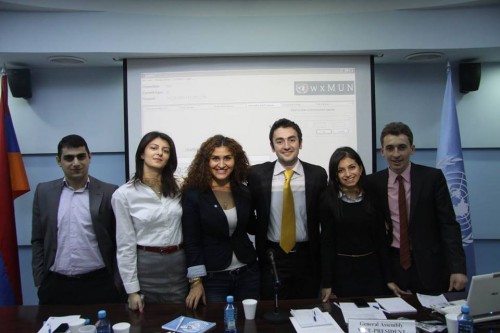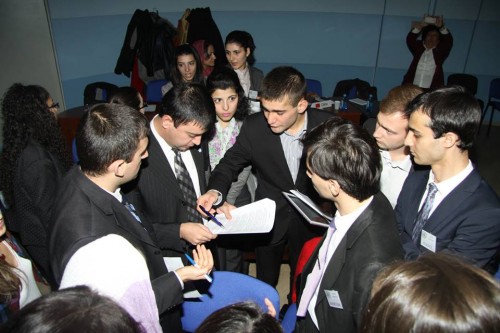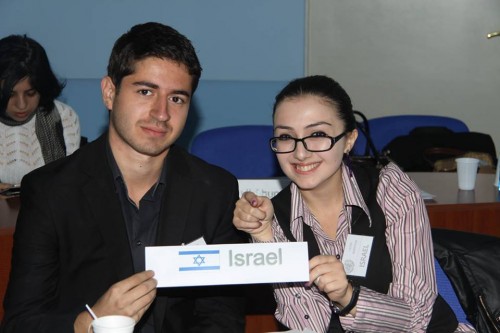
David Sarkisyan (third from right) and the directors of the UNGA Plenary pose for a photo. (Photo Courtesy of UN Armenia)
The marvelous story of the Inter-University Model United Nations 2013 (Yerevan) began in late August this year at the UN Department of Public Information. The highly successful I-U MUN 2013 that received wide media coverage in Armenia and appreciation of the Ministry of Foreign Affairs was “a meal that had been cooked for more than three months”. And I would like to share that story with you.
I-U MUN 2013 became an unprecedented phenomenon for Armenia mainly for two reasons: it was to be the first Inter-University Model UN organized here under the high patronage of UNDPI and it was to be the first General Assembly simulated. The goal was ambitious and so was the team. By the way, the organizing crew was selected from the UNDPI interns and employees, who had had a vast MUN experience in local and international simulations, and led by the Information Officer of the same division – Armineh Haladjian. The delegates-participants came from three leading national universities and were carefully selected (being mostly greatly experienced in the field of MUNs and other simulations). When it came to choosing the topic we did not hesitate much and grabbed the most actual and troublesome issue possible that was on the agenda of world politics – the Syrian issue. The urgency of the problem was even doubled for Armenia because of our large diaspora in Syria, the wave of immigration and just everybody’s feeling for his or her relatives living there, as well as the whole nation in trouble.
Having decided on the topic we have set the format of the two-day MUN. The first day was dedicated to the parallel sessions of the three main committees of the General Assembly and on the second day we gathered for the plenary session of the GA itself in the luxurious hall of the UN House Yerevan generously provided to us for that occasion. Speaking about the format I cannot avoid mentioning the two principles that were at the core of the I-U MUN: cooperation and competitiveness. Each state was represented by a team of three delegates selected from each of the three universities to participate separately in the sessions of the three committees. In the GA plenary the three delegates were defending interests of their respective countries jointly as a country delegation. This required a lot of team work and cooperation during both the preparatory period and the conference itself. Besides that a special award for the best position paper was introduced to further encourage the fruitful team work. At the same time aside from the competition between the individual participants the universities were competing with one another too. The MUN participants themselves elected the second-best and best delegates of each committee and of the General Assembly. At the end, based on the cumulative scores received, that were set for the above-mentioned nominations, and the winning university of the conference was announced.
However, I-U MUN 2013 would not have been what it was without its intense and really great preparation period. A whole MUN-school course was organized for the delegates prior to the conference. It included trainings on UN role and activity in international relations, issue-related seminars, trainings on Model UN itself (adapted to the format of I-U MUN 2013) and last but not the least speeches delivered by the top UN officials followed by Q&A sessions. All these activities were performed by UN staff members with the highest qualifications, the leading professors in the field of Arabic studies, high-ranking officials, as well as experienced MUN trainers.
Perhaps another important factor in the preparation was the wide use of social media and namely the activity in Facebook groups created for this purpose, where delegates shared information, negotiated and lobbied on-line. But what is of no less importance about those groups is that they help the relationship to last and contribute greatly to the development of Armenian MUN networking.




